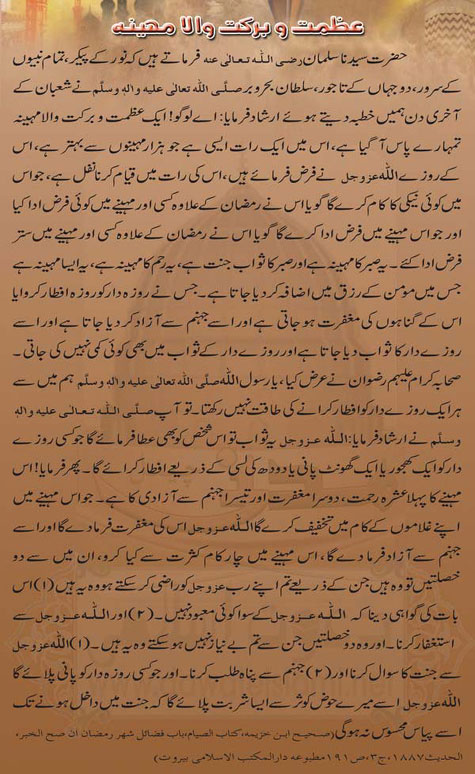
Azamt wala Mahina

Azamt wala Mahina
Ramadan – breaking fast at the end of the day
Narrated by Umar bin Al Khattab (Radhiallaho anho):
Allah’s Messenger (sallallaahu ‘alaihi wasallam) said “When night falls from this side and the day vanishes from this side and the sun sets, then the fasting person should break his fast.”
Sahih Al-Bukhari Vol. 3 : No. 175
Ramadan – Looking for Qadr in odd nights
Narrated by Aisha (Radhiallaho anha):
Allah’s Messenger (sallallaahu ‘alaihi wasallam) said, “Search for the Night of Qadr in the odd nights of the last ten days of Ramadan.”
Sahih Al-Bukhari Vol. 3 : No. 234
Ramadan – Sadaqat-ul-Fitr
Narrated by Abdullah b ‘Umar (Radhiallaho anho):
Allah’s Messenger (sallallaahu ‘alaihi wasallam) ordered the payment of Sadaqat-ul-Fitr before people go out for prayer.
Sahih Muslim
Ramadan – Gates of paradise for women
Narrated by Anas ibn Malik (Radhiallaho anho):
Allah’s Messenger (sallallaahu ‘alaihi wasallam) said, “When a woman observes the five times of prayer, fasts during Ramadan, preserves her chastity and obeys her husband, she may enter by any of the gates of Paradise she wishes.”
(Al-Tirmidhi 956, Abu Nu’aym transmitted it in al-Hilyah)
Ramadan – Giving up forged speech and evil acts
Narrated by Abu Hurairah (Radhiallaho anho):
Allah’s Messenger (sallallaahu ‘alaihi wasallam)said, “Whoever does not give up forged speech and evil actions, Allah is not in need of his leaving his food and drink (i.e. Allah will not accept his fasting.)”
Sahih Al-Bukhari Vol. 3 : No. 127
Ramadan – Not censuring each other for fasting
Narrated by Anas bin Malik (Radhiallaho anho):
We used to travel with Allah’s Messenger (sallallaahu ‘alaihi wasallam) and neither did the fasting persons criticize those who were not fasting, nor did those who were not fasting criticize the fasting ones.
Sahih Al-Bukhari Vol. 3 : No. 168
Ramadan – Be generous and study Quran
Narrated by Ibn Abbas (Radhiallaho anho):
Allah’s Messenger (sallallaahu ‘alaihi wasallam) was the most generous among the people, and he used to be more so in the month of Ramadan when Gabriel visited him, and Gabriel used to meet him every night Ramadan till the end of the month. The Prophet used to recite the Holy
Qur’an to Gabriel, and when Gabriel met him, he used to be more generous than a fast wind (which causes rain and welfare).
Sahih Al-Bukhari Vol. 2 : No. 288
Give food to the hungry
Narrated by Abu Musa Al Ashari(Radhiallaho anho):
Allah’s Messenger (sallallaahu ‘alaihi wasallam) said, “Give food to the hungry, pay a visit to the sick, and release (set free) the one in captivity (by paying his ransom).”
Sahih Al-Bukhari Vol. 7 : No. 286
Mentioning Allah’s Name on starting to eat
Narrated by Umar bin Abi Salama(Radhiallaho anho):
I was a boy under the care of Allah Messenger (sallallaahu ‘alaihi wasallam) and my hand used to go around the dish while I was eating. So Allah’s Apostle said to me, “O boy! Mention the Name of Allah and eat with your right hand, and eat of the dish what is nearer to you.” Since then I have applied those instructions when eating.
Sahih Al-Bukhari Vol. 7 : No. 288
Eating with the right hand
Narrated by Aisha(Radhiallaho anha):
Allah’s Messenger (sallallaahu ‘alaihi wasallam) used to love to start doing things from the right side whenever possible, in performing ablution, putting on his shoes, and combing his hair. (Al-Ash’ath said: The Prophet used to do so in all his affairs.)
Sahih Al-Bukhari Vol. 7 : No. 292
A believer is satisfied with a little food
Narrated by Abu Huraira(Radhiallaho anho):
A man used to eat much, but when he embraced Islam, he started eating less. That was mentioned to Allah’s Messenger (sallallaahu ‘alaihi wasallam), who then said, “A believer eats in one intestine (is satisfied with a little food) and a Kafir eats in seven intestines (eats much).”
Sahih Al-Bukhari Vol. 7 : No. 309
The Prophet (PBUH) said “Pass on knowledge from me even if it is only one verse”
Bismillah Walhamdulillah Was Salaatu Was Salaam ‘ala Rasulillah
As-Salaam Alaikum Wa-Rahmatullahi Wa-Barakatuhu
Ramadan – Nawafil Prayers
Narrated by Abu Huraira (Radhiallaho anho):
Allah’s Messenger (sallallaahu ‘alaihi wasallam)said, “Whoever fasted the month of Ramadan out of sincere Faith (i.e. belief) and hoping for a reward from Allah, then all his past sins will be forgiven, and whoever stood for the prayers in the night of Qadr out of sincere Faith and hoping for a reward from Allah, then all his previous sins will be forgiven .”
Sahih Al-Bukhari Vol. 3 : No. 231
Ramadan – Umra in Ramadan equivalent to Hajj
Narrated by Ibn Abbas (Radhiallaho anho):
When Allah’s Messenger (sallallaahu ‘alaihi wasallam) returned after performing his Hajj, he asked Um Sinan Al-Ansari, “What did forbid you to perform Hajj?” She replied, “Father of so-and-so (i.e. her husband) had two camels and he performed Hajj on one of them, and the second is used for the irrigation of our land.” The Prophet said (to her), “Perform ‘Umra in the month of Ramadan, (as it is equivalent to Hajj or Hajj with me (in reward).”
Sahih Al-Bukhari Vol. 3 : No. 86
Ramadan – Fasting on one’s behalf
Narrated by Aisha (Radhiallaho anha):
Allah’s Messenger (sallallaahu ‘alaihi wasallam)said, “Whoever died and he ought to have fasted (the missed days of Ramadan) then his guardians must fast on his behalf.”
Sahih Al-Bukhari Vol. 3 : No. 173
Ramadan – Suhur
Narrated by Anas bin Malik (Radhiallaho anho):
Allah’s Messenger (sallallaahu ‘alaihi wasallam)said, “Take Suhur as there is a blessing in it.”
Sahih Al-Bukhari Vol. 3 : No. 146
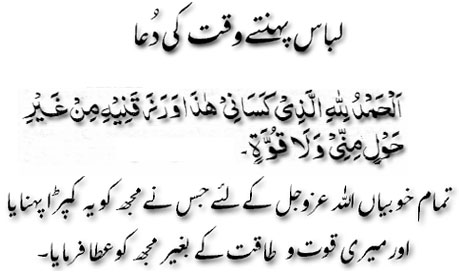
dua at the time of wearing dress
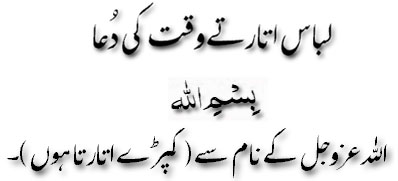
dua at the time of taking off clothes
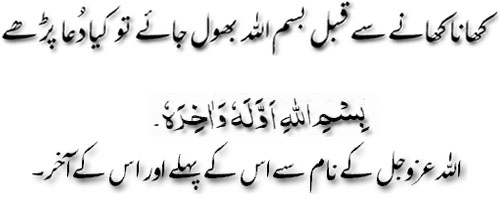
Khana dua
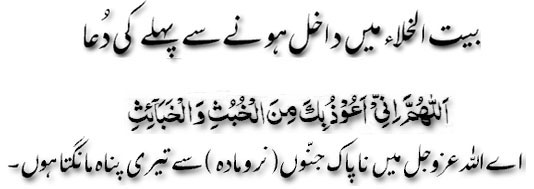
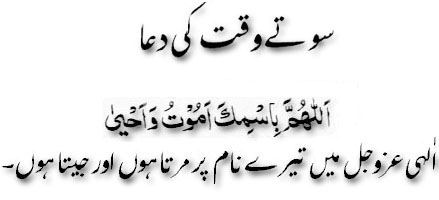
Soney Waqt ki dua
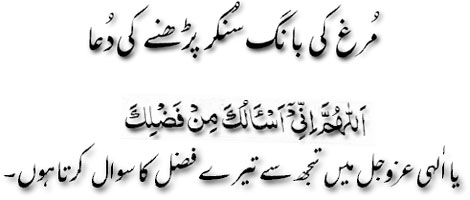
murgh bang dua
In the name of Allah, The Beneficent, The Merciful
1. O ye who believe! Fulfill your undertakings.
(AlQuran. Surah AlMaaida. Para # 6)
2. O ye who believe! Why say ye that which ye do not (actually) do?
It is most Hateful in the Sight Of Allah that ye should say that which ye do not (actually) do.
(AlQuran. Surah AlSSaf. Para # 28)
3. And keep the Covenants; surely of the Covenant, it will be asked.
(AlQuran. Surah Banii Israael. Para # 15)
4. And fulfill the Covenant of Allah when ye have covenanted, and Break not your Oaths after the asseveration of them, and after ye have made Allah surety over you. Surely Allah knoweth what ye do.
(AlQuran. Surah AlNakhl. Para # 14)
DU’A AT THE TIME OF DISTRESS
“Has -bi -yal-laa-hu wa ni’- mal wa-keel”.
Allah (SWT) is sufficient for me and He is the Best Helper.
DU’A BEFORE SLEEPING
“Allahumma bismika amuutu wa ahyaa”.
O Allah (SWT)! With your name, I die and I live.
DU’A AFTER WAKING UP
“Alhamdulillaahillazi ahyaanaa ba’da maa amaata-naa wa ilaihinnushuur”.
All praise to Allah (SWT), Who revived us to life after giving us death, and to him, we shall have to return.
DU’A IN THANKFULNESS
“Yaa rabbil lakal”hamdu kama yanbaghii lijalaali wajhika, wa’aziimi sultaanik.”
O my Lord, all praises be to You as it should be due to Your Might and the Greatness of Your Power.
DU’A IN APPRECIATION OF OTHER’S KINDNESS
“Jazaakallaahu khairaa.”
May Allah (SWT) return your kindness.
DU’A FOR PARENTS
“Rabbighfir lii wa liwaalidayya wa lilmu”miniina yauma yaquumul’hisaab, Rabbirhamhumaa kamaa rabbayaanii shaghiiraa.”
O Lord, forgive me, my parents and Muslims in the Hereafter. O Lord, show mercy on them as they have nourished me when I was young.
DU’A BEFORE STUDYING
“Allaahumma infa’nii bimaa ‘allamtanii wa’allimnii maa yanfa’unii.”
O my Lord, make useful for me what you hath thought me and teach me knowledge that will be useful to me.
DU’A FOR KNOWLEDGE
“Rabbi Zid-Nee ‘iL-Maa”
My Lord, increase me in Knowledge.
Israa and Miraaj – Dr. Bilal Philips
Masjid Al-Aqsa and The Dome of the Rock
Israa literally means a journey by night and Miraaj literally means an elevator, i.e., an instrument which lifts something up.
But, in Islaam, Israa refers to a miraculous night journey made by the last Prophet (sallallaahu alayhi wa sallam) from Makkah to Jerusalem, and Miraaj refers to the vehicle which took the Prophet (sallallaahu alayhi wa sallam) from Jerusalem, up and out of the universe, through the seven heavens, and into the direct presence of Allaah.
Towards the end of a calm night, one year before the Hijrah, the roof of Prophet Muhammad’s (sallallaahu alayhi wa sallam) house split open and angel Jibreel (Gabriel) descended into the Prophets (sallallaahu alayhi wa sallam) room. He went over to the Prophet (sallallaahu alayhi wa sallam), opened his shirt, and cut open his chest.
He then removed his heart and washed it inside with Zam Zam water. After he had completed washing it, he then brought a gold dish filled with Eemaan (faith) and Hikmah (wisdom), emptied it into the Prophets (sallallaahu alayhi wa sallam) chest, and then closed it all up.[1]
Jibreel then nudged the Prophet (sallallaahu alayhi wa sallam) until he awoke. When the Prophet (sallallaahu alayhi wa sallam) got up, Jibreel took a hold of his hand and lead him outside of his house to the gate of Kabah.
There the Prophet (sallallaahu alayhi wa sallam) found a strange unearthly animal. It was smaller than a mule but larger than a donkey, white in color and having a wing on either of its hind legs. He was informed that its name was Buraaq, a name taken from the Arabic word Barq which means a flash of lightning.
Jibreel helped the Prophet (sallallaahu alayhi wa sallam) mount it and they set off to the north. Each stride of the Buraaq took it to the horizon, and, in no time they reached Jerusalem. There the Prophet (sallallaahu alayhi wa sallam) dismounted and tied the animal to the same ring on the door of al-Masjid al-Aqsa used by the prophets.
The Prophet (sallallaahu alayhi wa sallam) entered the Masjid and prayed two Rakahs. When he finished he noticed a group of other prophets also making Salaah there. He saw among them Prophet Moosaa, Prophet Eesaa, and Prophet Ibraaheem.
Prophet Muhammad (sallallaahu alayhi wa sallam) was then told to lead them all in Salaah. When the Prophet (sallallaahu alayhi wa sallam) finished this Salaah, someone said to him, This is Maalik, the guardian of the Hellfire, so give him Salaams. When he turned around to greet him, the angel gave him Salaams before he had time to do so.[2] Jibreel then brought two vessels and presented them to the Prophet (sallallaahu alayhi wa sallam). One was filled with wine and the other was filled with milk. The Prophet (sallallaahu alayhi wa sallam) chose the vessel filled with milk and drank from it.
Jibreel then said You have been guided to the Fitrah.[3]
